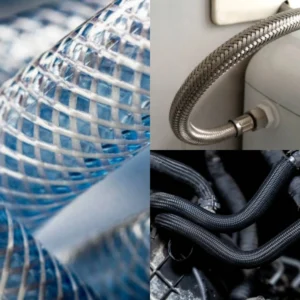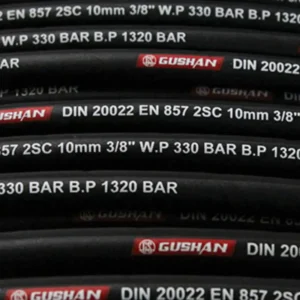Propane and natural gas are both popular fuels for heating, cooking, and industrial applications, but the hoses used for each are not always interchangeable. Understanding the differences in pressure, chemical composition, and hose material is essential for safety and optimal performance in gas systems.
Using the wrong hose can lead to leaks, reduced efficiency, or even dangerous accidents. While both types of hoses may look similar, factors such as flexibility, temperature tolerance, and regulatory compliance determine whether a hose is suitable for propane, natural gas, or both. Choosing the right hose is critical for safe and reliable operation.
What are Propane Hoses?
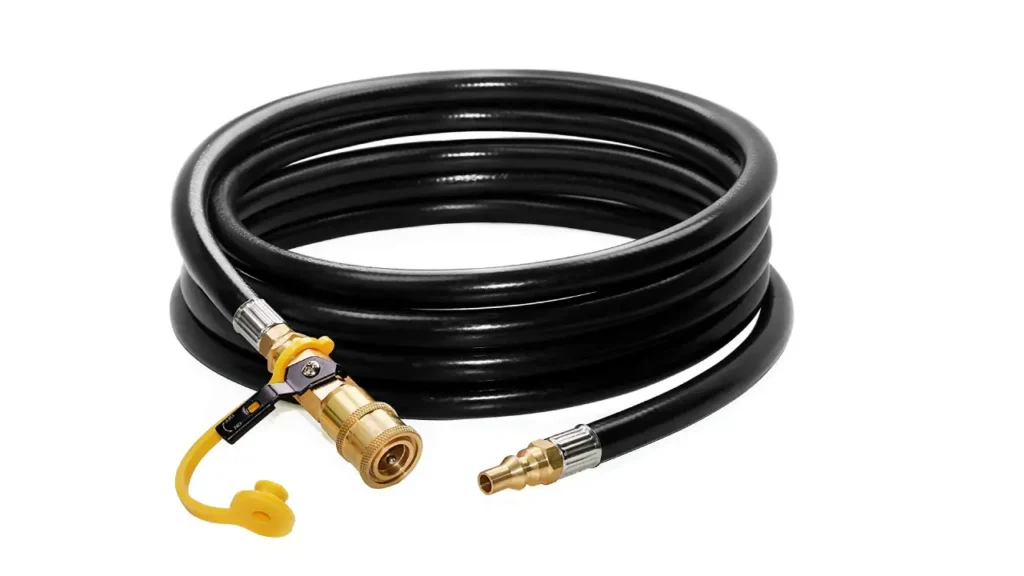
Propane hoses are specialized flexible tubes designed to safely transport propane gas from tanks to appliances. They are engineered to handle higher pressures than natural gas hoses and are made from materials that resist leaks, corrosion, and environmental damage. Proper selection and maintenance are essential for safe and efficient operation.
- High-pressure resistance – Propane hoses are built to withstand elevated pressures typical of propane systems. Choosing hoses rated for the correct pressure prevents bursts, leaks, or equipment damage, ensuring safety in residential, commercial, or industrial applications.
- Durable materials – These hoses are made from reinforced rubber, thermoplastic, or composite materials that resist heat, ozone, and chemicals. Durable construction ensures long-lasting performance and reduces the risk of cracks, leaks, or failures under various environmental conditions.
- Flexible design – Propane hoses offer flexibility for easy installation in tight or awkward spaces. Proper flexibility reduces stress on connections, prevents kinks, and maintains a consistent gas flow, which is vital for appliance performance and safety.
- Certified safety standards – Propane hoses meet strict safety certifications and regulations, including CSA or UL standards. Compliance guarantees that hoses perform reliably under expected conditions and provides peace of mind for residential and commercial users.
What are Natural Gas Hoses?
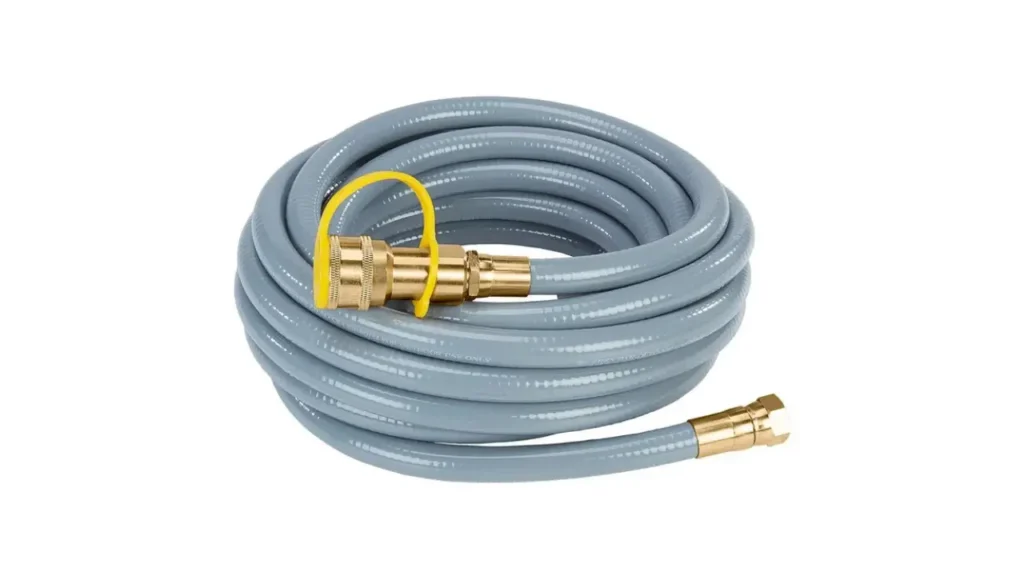
Natural gas hoses are specialized tubes designed to safely transport natural gas from a supply source to appliances or equipment. These hoses are engineered to withstand specific pressures, environmental conditions, and chemical interactions. Proper hose selection ensures efficient gas flow, reduces leaks, and maintains safety in residential, commercial, or industrial systems.
- Pressure rating – Natural gas hoses are rated to handle pressures typical for gas supply lines. Using a hose outside its rated pressure can lead to leaks, bursts, or system failure. Always choose hoses with the correct pressure capacity for reliable and safe operation.
- Material composition – Most natural gas hoses are made of reinforced rubber or flexible polymers to resist chemical reactions, corrosion, and environmental wear. The right material prevents cracking, leaks, or degradation, ensuring long-term durability and consistent performance.
- Temperature resistance – Gas hoses must withstand temperature fluctuations from both the environment and the flowing gas. Hoses that cannot handle temperature extremes may become brittle, weaken, or fail, creating safety hazards and interrupting gas flow.
- Connection fittings – Proper fittings are essential to secure the hose to gas appliances or regulators. Incorrect or loose fittings can cause leaks or disconnections, increasing the risk of accidents and reducing system efficiency.
Are Propane and Natural Gas Hoses the Same?
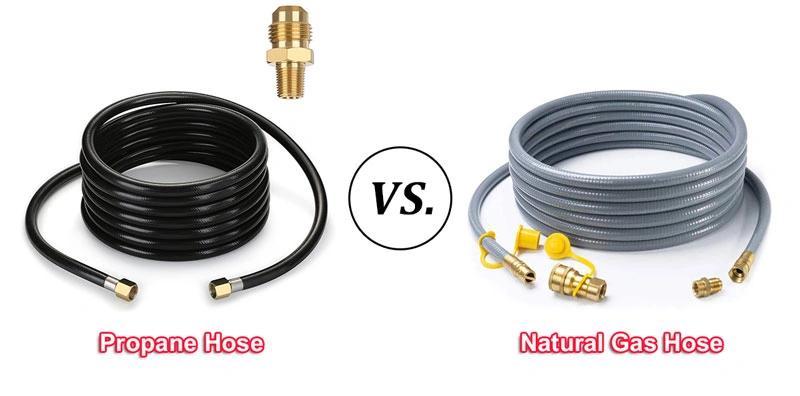
Propane and natural gas hoses are both used to transport fuel to appliances, but they are not always interchangeable. Differences in pressure, material compatibility, and safety standards mean using the wrong hose can lead to leaks, system damage, or even serious safety hazards in residential, commercial, or industrial settings.
- Pressure requirements – Propane operates at higher pressures than natural gas. Using a natural gas hose for propane can cause bursts or leaks. Selecting a hose rated for the correct pressure ensures safe operation, prevents accidents, and maintains consistent gas flow.
- Material compatibility – Propane can degrade certain hose materials over time. Hoses for propane are made of materials resistant to its chemical properties, while natural gas hoses may not be compatible. Choosing the right material prevents cracking, wear, or leaks during use.
- Temperature and environmental resistance – Both gases require hoses that withstand temperature fluctuations, UV exposure, and outdoor conditions. Hoses not designed for specific gas types may fail under extreme conditions, compromising safety and efficiency in installations.
- Fittings and connections – Propane and natural gas hoses often use different fittings or regulators. Using the wrong connections can result in leaks or disconnections. Ensuring proper fittings for each gas type is critical for secure and safe operation.
Pressure Ratings of Propane and Natural Gas Hoses
Propane and natural gas hoses are designed to handle specific pressure ranges to ensure safe and efficient gas delivery. Understanding these pressure ratings is critical, as using a hose beyond its rated capacity can lead to leaks, bursts, or equipment damage. Proper selection maintains system safety and performance.
- Propane hose pressure – Propane typically operates at higher pressures, often ranging from 150 to 250 PSI for standard applications. Hoses must be rated accordingly to safely manage these pressures without risk of rupture or degradation over time.
- Natural gas hose pressure – Natural gas operates at lower pressures, usually around 0.25 to 0.5 PSI for residential supply. Using hoses rated for higher pressures is safe, but lower-rated hoses should never be used for propane.
- Safety margin considerations – Always choose hoses with a pressure rating above the system’s maximum operating pressure. This safety margin prevents accidents, ensures durability, and accounts for pressure spikes or fluctuations in gas supply.
- Regulatory compliance – Gas hoses must meet local and national safety standards. Certified hoses indicate they have been tested for pressure tolerances, chemical resistance, and environmental conditions, ensuring safe operation for propane or natural gas.
| Hose Type | Typical Operating Pressure | Maximum Pressure Rating | Suitable Applications |
|---|---|---|---|
| Propane Hose | 150–250 PSI | 300 PSI | BBQs, heaters, industrial propane |
| Natural Gas Hose | 0.25–0.5 PSI | 1 PSI | Residential, commercial gas lines |
The Importance of Hose Materials
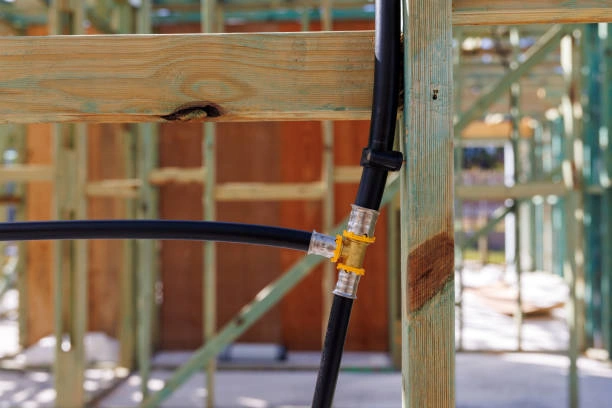
Beyond pressure ratings, the materials used in the construction of propane and natural gas hoses are specifically chosen to resist the unique chemical properties of each gas and the pressures they operate under. Propane hoses are typically made from heavier-duty rubber compounds, often reinforced with braided steel or synthetic fibers to provide the necessary strength and flexibility.
These materials are designed to resist the corrosive properties of propane and prevent permeation of the gas through the hose walls, which can be a safety hazard. Natural gas, while not as high-pressure, can still contain trace elements that require specific materials to prevent degradation. Natural gas hoses are often made from different synthetic rubbers or thermoplastic materials that are suitable for lower pressures and less aggressive chemical exposure.
Using a propane hose for natural gas is generally safer than the reverse, but it’s still not recommended due to potential long-term material breakdown or unnecessary bulk.
Connectors and Fittings
Another critical difference between propane and natural gas hoses lies in their connectors and fittings. You’ll quickly notice that the fittings on propane hoses are generally different from those on natural gas hoses. Propane connections often use POL (Prest-O-Lite) fittings or ACME nuts for larger tanks, and specific quick-connect fittings for smaller appliances.
Natural gas typically uses flare fittings or NPT (National Pipe Taper) threads, which are designed for the lower pressure and continuous supply of natural gas lines. We strongly advise against using adapters to try and force a propane hose onto a natural gas connection or vice versa.
While an adapter might seem like a quick fix, it introduces an additional point of potential leakage and compromises the integrity of the gas system.
What to Look For Before You Connect
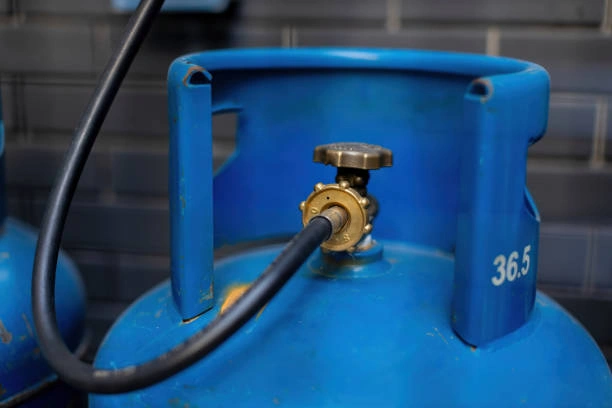
Before you even think about connecting a hose, a thorough visual inspection and understanding of the labeling are crucial. This is your first and often most effective line of defense against using the wrong type of hose. Propane hoses are typically thicker and more rigid due to their higher pressure requirements, and they will almost always be clearly labeled with “LP Gas,” “Propane,” or “LPG.” You might also see a maximum working pressure rating.
Natural gas hoses are often more flexible and will be marked “Natural Gas” or “NG.” They’ll also typically have a lower pressure rating. It’s a good practice to periodically check your hoses for any signs of wear, cracks, bulges, or fraying, regardless of the gas type. Even a properly matched hose can become unsafe over time due to exposure to the elements or physical damage. When in doubt, replace it.
Here’s a quick comparison table to summarize the key differences:
| Feature | Propane Hose | Natural Gas Hose |
| Operating Pressure | High (e.g., 10-250 PSI) | Low (e.g., 0.25-0.5 PSI) |
| Material | Heavy-duty rubber, reinforced | Synthetic rubber, thermoplastic |
| Flexibility | Less flexible, more rigid | More flexible |
| Common Fittings | POL, ACME, specific quick-connect | Flare, NPT |
| Labeling | “LP Gas,” “Propane,” “LPG” | “Natural Gas,” “NG” |
| Intended Use | BBQ grills, outdoor heaters, RVs | Furnaces, water heaters, stoves, fireplaces |
| Safety Risk (if mismatched) | Rupture, severe leak, fire, explosion | Incompatible fittings, potential long-term issues |
Common Applications: Where You’ll Find Each Type
Knowing where you’ll typically find propane and natural gas hoses can further clarify their distinctions and help you ensure you’re using the right equipment for the job. Propane hoses are commonly used with portable appliances, such as:
- BBQ grills and outdoor kitchens: This is perhaps the most common application, connecting a portable propane tank to your grill.
- Outdoor patio heaters: Keeping you warm on cool evenings, these also rely on portable propane tanks.
- RV appliances: From cooktops to water heaters, many RVs utilize propane for their onboard systems.
- Camping stoves and lanterns: Smaller, portable propane cylinders connect to these for outdoor adventures.
Natural gas hoses, on the other hand, are designed for stationary, fixed installations where natural gas is piped directly to the home or building. You’ll typically find them connected to:
- Indoor gas ranges and ovens: Your kitchen appliances often run on natural gas.
- Water heaters: Providing hot water for your home.
- Furnaces and boilers: Heating your living spaces.
- Gas fireplaces: Offering ambiance and warmth.
- Outdoor natural gas grills: Some homes have dedicated natural gas lines for permanent outdoor grilling setups.
It’s crucial to remember that even if you have an outdoor grill, if it’s connected to your home’s natural gas line, it requires a natural gas hose, not a propane one. The key is to match the hose to the source of the gas and the appliance’s design, not just its function.
Conclusion
In conclusion, propane and natural gas hoses are not the same and must be selected based on specific fuel requirements, pressure ratings, and material compatibility. Using the wrong hose can compromise safety, reduce lifespan, and create potential hazards for your gas appliances or systems.
Always verify hose specifications, check manufacturer recommendations, and consult experts before installation. Proper hose selection ensures safe operation, prevents leaks, and maintains consistent gas flow. Awareness of differences between propane and natural gas hoses is key to system efficiency and long-term safety.
For reliable, gas hoses, get wholesale propane hoses and natural gas hoses from Gushan Rubber. Ensure safe, durable connections and top performance for all your gas applications with our trusted products.


